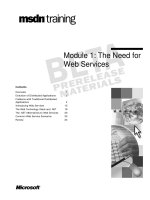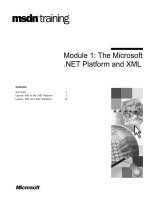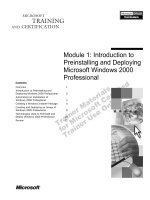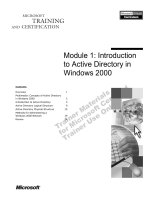Tài liệu Module 1: Overview ppt
Bạn đang xem bản rút gọn của tài liệu. Xem và tải ngay bản đầy đủ của tài liệu tại đây (270.06 KB, 20 trang )
Module 1: Overview
1
THIS PAGE LEFT INTENTIONALLY BLANK
0RGXOH#4=#2YHUYLHZ##4²6
2EMHFWLYHV
At the end of this module, you will be able to
„
Define MSF
„
Articulate at a high level how MSF addresses
the root causes of failure
„
Describe where this course fits in the information
technology (IT) life cycle
„
Define the key goals of Principles of
Infrastructure Deployment
4²7# # 0RGXOH#4=#2YHUYLHZ
/HVVRQV
Lessons
1. MSF Overview
2. Where Infrastructure
Deployment Fits
0RGXOH#4=#2YHUYLHZ##4²8
/HVVRQ#4=#06)#2YHUYLHZ
Lesson 1:
MSF Overview
Best practices for distributed
computing that help bridge
the gap between technology
and success
4²9# # 0RGXOH#4=#2YHUYLHZ
,7#/DQGVFDSH
Frozen in
the Past
In the
Abyss
Competitive
Leading
Moving
Ahead
Climbing
Out
Falling In
Avoiding
the Abyss
„
History of low
or erratic IT
spending
„
Mainframe-
based
application
portfolio
„
Long
development
times
„
Little flexibility
„
Rapidly increasing
IT spending
„
Budget dominance by operations
and maintenance costs
„
Exploding complexity of
distributed computing
environment
„
Ineffective new development
„
Controlled
spending
„
Robust and
simple
distributed
computing
environment
„
Up-to-date
applications
portfolio
„
Effective new
development
„
Focused spending on
achieving competitive
advantage
„
Highly robust and
flexible infrastructure
„
Several proprietary
applications that
support industry-
leading processes
„
Organization that is
skilled at employing
technology to support
business value
From our research, we believe that rapid changes in information technology and
in business practices have opened up an IT abyss that companies need to cross
in order to get maximum value from their IT investments.
Previous simplicity of automating transaction processing is being replaced with
more-difficult-to-measure, fast-paced, business-redesign-oriented IT work. IT
today is addressing more cross-functional efforts.
Organizations that understand the many potential facets of enterprise IT
management are better prepared to address the challenges successfully.
0RGXOH#4=#2YHUYLHZ##4²:
5RRW#&DXVHV#RI#)DLOXUH
)DLOXUH#RI#SURFHVV#DQG
RUJDQL]DWLRQ/#QRW#SHRSOH
„
Separation of goal and
function
„
Separation of business
and technology
„
Lack of common language
and process
„
Failure to communicate
and act as a team
„
Processes that are
inflexible to change
Looking deeper into the “people” aspects of delivering a successful solution, we
see that the solution often suffers from artificial walls between the people who
are experiencing the problem and the people who are trying to solve the
problem.
4²;# # 0RGXOH#4=#2YHUYLHZ
)UDPHZRUN=#6XSSOHPHQWLQJ#0HWKRGRORJLHV
1st Avenue
Plum Street
Orange Street
.
.
Smith River
2nd Avenue
3rd Avenue
4th Avenue
.
.
.
.
.
S
MSF
.
EW
.
.
N
.
.
.
.
A
methodology
applies specific
directions to a
known
destination
A
framework
,
like a compass,
verifies progress
and provides
directional
guidance when
directions for
your type of
project have
not been
documented yet
MSF is Microsoft’s guide for planning, building, and managing distributed
computing systems. Like a compass, it guides product developers and
consultants in a consistent direction without involving everyone in the details of
how to get there (the map).
This allows everyone to agree on the higher-level aspects of the vision,
architecture, responsibilities, and many of the other factors that determine the
success of a distributed computing application. Once a shared vision is
established, detailed methodologies can be used if needed. MSF serves as a
useful tool for measuring progress against the original goals.
Key drivers for MSF include:
„
Common language
„
Consistency
„
Skills planning and development
„
Shared resources
„
Distributed computing









